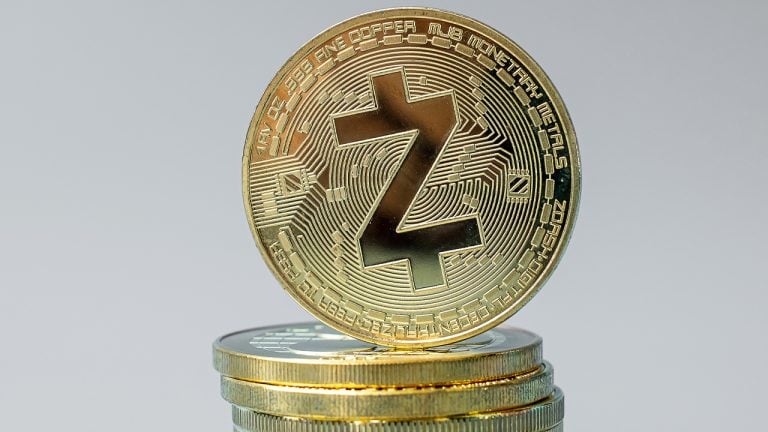 According to a recent Form N-1A, Grayscale has approached the U.S. Securities and Exchange Commission (SEC) with a proposal for a unique exchange-traded fund (ETF) dedicated to the privacy and cybersecurity realm. The Grayscale Privacy ETF aims to be the first to encapsulate the burgeoning sector of privacy technology and cybersecurity. Privacy Takes Center Stage […]
According to a recent Form N-1A, Grayscale has approached the U.S. Securities and Exchange Commission (SEC) with a proposal for a unique exchange-traded fund (ETF) dedicated to the privacy and cybersecurity realm. The Grayscale Privacy ETF aims to be the first to encapsulate the burgeoning sector of privacy technology and cybersecurity. Privacy Takes Center Stage […]
Source link
Zcash
A partnership between privacy-focused projects Nym and Zcash was recently announced. The partnership aims to address some persisting issues in the sector to enhance user protection and data privacy in the Zcash ecosystem.
Data Leakage, A Challenging Issue
Electric Coin Company (ECC), the Zcash development organization, is collaborating with Nym, a privacy blockchain project focused on enhancing data confidentiality. The collaboration is possible through a Zcash Community Grants (ZCG) grant, as the project’s team announced on its X (former Twitter) account.
The partnership aims to address challenging user protection issues by integrating Nym’s mixnet into the Zcash ecosystem. Integrating with the Zcash light client libraries would allow the wallet developers to implement Nym mixnet’s privacy protection at their discretion.
1/6 🎉 Nym is happy to announce a grant from Zcash Community Grants to integrate the Nym mixnet with Zcash, and enhance privacy for Zcash users by protecting against metadata leaks.
— Nym (@nymproject) February 13, 2024
The goal, as the announcement explains, is for the integration process of Nym and Zcash to fill the gap in the network layer. This gap allows the metadata of user’s transactions to be traceable and leaves the data vulnerable, which then presents a privacy problem for users, as the post explains:
Powerful adversaries can analyze traffic patterns such as the stream of TCP/IP packets used to submit transactions, which can then be used to de-anonymize users. ISPs can snoop on traffic patterns to passively record Zcash activity. And the growing crypto surveillance industry can passively spy on peer-to-peer traffic, as well as conduct active attacks.
Nym will work with Zcash’s already existing privacy-preserving infrastructure to “help provide an end-to-end protected solution for users’ privacy. Zcash uses zero-knowledge proofs to secure transaction privacy, but “even advanced privacy protections like Zcash’s auto-shielding feature are vulnerable at the network later.”
The Nym mixnet is a technology that prevents government, corporate, and criminal surveillance adversaries from tracing metadata by encrypting user data into sphinx packets and dispersing them across global ‘mix nodes’, making metadata patterns untraceable and ensuring online privacy:
The mixnet achieves this by splitting data into identically sized encrypted Sphinx packets and dispersing these in three hops to ‘mix nodes’ worldwide at randomized intervals. Next, the mixnet shuffles in dummy ‘cover’ traffic, further complicating tracing. Together these features make tracking metadata patterns impossible even for powerful adversaries with a global view of the network.
A Shared Vision: Privacy For Everyone
Nym and Zcash are privacy-focused projects that protect users’ rights to their personal information and transaction data. “It is an alienable right to a dignified life free from gross intrusion and interference,” said Harry Halpin, cofounder and CEO at Nym Technologies.
Halpin also commented on the state of the digital realm regarding privacy matters. The CEO believes that although intrusion and interference are the “normal state of affairs,” a change is needed. “With this groundbreaking integration, Nym and Zcash are working to make real privacy online a reality,” he concluded.
Josh Swihart, CEO of ECC, expressed his positive outlook on the partnership, reaffirming that network-level privacy has been a “missing piece since Zcash’s inception.” He believes that privacy ecosystems coming together will only “deepen protections from everyday users to protect their financial privacy.”
Global regulators have scrutinized privacy-focused projects and accused them of enabling criminal activity. Last year, Zcash (ZEC), alongside other privacy coins like Monero (XMR), was announced to be delisted from Binance, the largest crypto exchange in the world, in four European countries. Similarly, Binance recently announced its plan to delist Moreno in the US amid regulatory pressure.

ZEC is trading at $20.71 in the hourly chart. Source: ZECUSDT on tradingview.com
Feature image from Unsplash.com, Chart from TradingView.com
Disclaimer: The article is provided for educational purposes only. It does not represent the opinions of NewsBTC on whether to buy, sell or hold any investments and naturally investing carries risks. You are advised to conduct your own research before making any investment decisions. Use information provided on this website entirely at your own risk.
Binance shakes privacy coin market with possible Zcash and Monero delisting threats

Crypto exchange Binance said it could delist three privacy tokens, including Zcash (ZEC), Monero (XMR), and Horizen (ZEN), because they are at risk of no longer meeting its listing criteria, according to a Jan. 4 statement.
As such, the exchange placed a “Monitoring tag” on these privacy tokens and other digital assets like Aragon, Firo, Keep3rV1, MobileCoin, Reef, and Vai.
Binance’s decision, alongside the broader market drawdown, has significantly impacted these digital assets as the privacy sector is down more than 6% during the last 24 hours and by nearly 10% in the past week, according to CryptoSlate’s data.
During the past day, Monero, Zcash, and Horizen are down 5%, 12%, and 16%, respectively.
Meanwhile, Binance now requires users interested in these assets to take quizzes every 90 days to ensure they understand the inherent risks of trading them on its spot and/or Margin platforms.
Why is Binance delisting them?
Binance stated that:
“Tokens with the Monitoring Tag exhibit notably higher volatility and risks compared to other listed tokens. These tokens are closely monitored, with regular reviews conducted. Keep in mind that tokens with the Monitoring Tag are at risk of no longer meeting our listing criteria and being delisted from the platform.”
The exchange further clarified that its decision was part of a periodic project review, assessing criteria like team commitment, trading volume, network security, and liquidity.
Last year, Binance said it would delist several privacy coins in compliance with European local laws and regulations. At the time, market observers pointed out that the move was attached to the high regulatory scrutiny privacy coins have attracted globally.
OKX, another top cryptocurrency platform, revealed intentions to delist several privacy-focused cryptocurrencies, including Zcash and Monero, by Jan. 5 because they do not align with its listing criteria.
As of press time, Binance has yet to respond to CryptoSlate’s request for additional commentary.
OKX delisting triggers price fall for privacy coins Zcash and Monero

The price of several privacy-focused cryptocurrencies, including Zcash (ZEC) and Monero (XMR), fell the past day after crypto exchange OKX said on Dec. 29 that it would delist them on Jan. 5 because they do not align with its listing criteria.
Data from CryptoSlate shows that the entire ‘privacy cryptos’ sector witnessed a decline of 3.4%, impacting major cryptocurrencies across the board. During the reporting period, stalwart privacy coins like Monero and Zcash dipped by 2.4% and 9.37%, respectively.
Other tokens to be delisted by OKX include Dash, Powerpool, and Horizen, which fell by as much as 14% during the reporting period.
“We will delist the above-mentioned trading pairs at the delisting times listed above. We advise users to cancel orders pertaining to these trading pairs before the delisting. Otherwise, the system will automatically cancel these orders. The cancellation may take 1-3 working days,” OKX added.
Concurrently, OKX has halted deposits for the affected cryptocurrencies and intends to cease withdrawals by March 5, 2024, allowing holders adequate time to withdraw their assets. Nevertheless, once the delisting process is complete, trading these digital assets will become impossible.
Curiously, certain privacy coins like MINA remain listed on the exchange, experiencing a 7.5% increase following this delisting announcement.
However, it’s worth noting that OKX is not exclusively delisting privacy tokens. The exchange also included other trading pairs belonging to digital assets like Kusama, Flow, Kyber Network, and Aragon in the assets to be delisted.
Why is OKX delisting privacy coins?
While OKX hasn’t explicitly detailed the reasons behind its decision, observers have suggested that the move might have been influenced by the exchange’s effort to comply with regulatory measures.
Privacy coins have attracted regulatory scrutiny due to concerns about their potential use in illicit activities within the crypto space.
Earlier in the year, Binance said it would delist several privacy coins in compliance with local laws and regulations.



